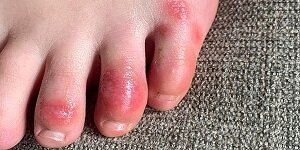Recognize the new and dangerous sign of coronary heart disease
Scientists initially believed that the corona had a significant effect on the lungs, but new research shows that the corona virus also affects entire organs.
Scientists believe that the corona virus only affects the lungs of people, but new research shows that the virus affects all parts of the body.
Fever, cough, and loss of sense of smell and taste are known symptoms of coronary heart disease. Anyone infected with the virus hopes to get out of the experience with as little damage as possible, but even if you survive the disease, you may have problems in the future, one of which is “corona fingers” or “Quidd’s fingers.” Is called.
Scientists initially believed that the coronavirus was a disease that primarily affected the lungs, but over the months, there were growing signs that the coronavirus was affecting other parts of the body. Some people have noticed inflammation of the skin of the toes, which resembles swollen toes.
Another symptom that may occur after coronavirus infection and is less commonly reported by patients is that some people have an infection in the toes that can be accompanied by pain and itching.
It is an inflammation of the skin of the toes that is similar to swelling and is a long-term symptom of coronary heart disease, but the toes are rarely affected.
This symptom disappears on its own after about 10 to 14 days. However, some also experience changes in the foot for up to 6 months. Evidence has shown that infection of the fingers is more common in people under 31 years of age. Such skin changes are recorded in the International Report on Skin Diseases Cavid 19. Data have been recorded from more than a thousand patients from about 40 countries who have undergone skin changes due to the Corona virus.
Most patients with this symptom describe it as swelling and discoloration of the finger skin to red, purple, and then blue. After that, the blisters usually appear and eventually turn black. Swelling may be normal and may be accompanied by pain and itching.
Due to the lack of research in this area, no official recommendation has yet been provided for the treatment of the “Quidd 19 finger” symptom. But in general, experts recommend keeping people warm and lean.
Fortunately, there is no evidence that this complication may be dangerous, but research is still ongoing.
